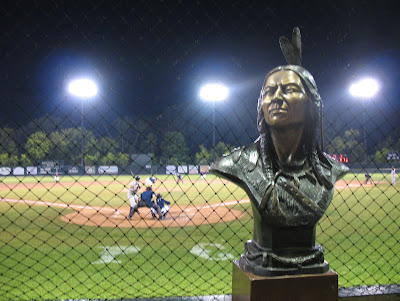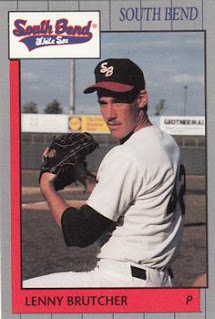G21D Interview, Part 1: Christmas Morning
 Rick Lancellotti stands next to a row of bats at his baseball academy. Several of the bats mark milestones from his 17-season career
Rick Lancellotti stands next to a row of bats at his baseball academy. Several of the bats mark milestones from his 17-season careerPart 1: Christmas Morning | Part 2: Moving Up
Part 3: Stunned | Part 4: Lived It | Postscript: How Cool It Was
 DEPEW, NY - Rick Lancellotti remembers it vividly. It was August 1982 and his AAA manager casually told Lancellotti he wasn't going to make 100 RBIs on the year.
DEPEW, NY - Rick Lancellotti remembers it vividly. It was August 1982 and his AAA manager casually told Lancellotti he wasn't going to make 100 RBIs on the year.Already at 95, there was no way Lancellotti wouldn't make 100, Lancellotti responded. Unless there was some intervention by his manager, Doug Rader.
"I go, 'Why, are you going to hold everybody up at third?' " Lancellotti recalled recently. "He goes 'no, I'm gonna send you to the big leagues."
His teammates immediately rushed him, jumping on him and congratulating him. They knew how hard it was to get that call, Lancellotti said.
"It's like the biggest thrill you can imagine," Lancellotti told The Greatest 21 Days in an sit-down interview at his baseball school outside Buffalo. "It's like being 5 years old, coming down the stairs for Christmas, you're head's coming off your body."
Lancellotti was fortunate enough to see time in three major league seasons, his first marked his first major league hit and RBIs, by a game-saving catch, and then then a life-draining dressing-down by his Hall of Fame manager.
Beyond that first big league season, Lancellotti's career would take multiple turns, some he would later regret. Others he would not regret one bit.
Lancellotti recounted many of those turns to The Greatest 21 Days at his Buffalo School of Baseball. He has taught the game there since 1993, the year after his retirement from baseball.
At the school, Lancellotti works with young players, passing along the lessons he learned in his 17 years as a player. Many of the key moments of that career are displayed on the baseball school's walls in the form of bats, photographs and news articles and a map.
 The map on the school wall. "Where pro ball took me during 17 years," it reads. Not pictured are Japan, Italy, Mexico, Columbia and Venezuela.
The map on the school wall. "Where pro ball took me during 17 years," it reads. Not pictured are Japan, Italy, Mexico, Columbia and Venezuela.Lancellotti's playing days took him through such varying places as Charleston, S.C., and Salem, Va., to Hawaii, Las Vegas and Pawtucket, where he made it into the 1990 CMC set, his No. 24 bat laying over his left shoulder on the card photo.
It also took him to Japan and Italy, the Japan choice he would come to regret.
Wherever he went, he hit home runs, so many that he was told he got a record, one that he didn't want.*
Then, in spring 1995, Lancellotti used the strike and replacement ball to speak his mind to a major league union he felt didn't care about those like himself who put their time in in the minor leagues and had little to show for it when it was all over.
But in August 1982, Lancellotti was going to the big leagues.
He was told of his call up as the Islanders visited Vancouver, and before the game. The call-up meant Lancellotti wasn't playing that night. Lancellotti wanted to play, but Rader kept him out, guarding against injury to his young hitter.
The next morning, Lancellotti was on his way to San Diego. He had already just flown in to Vancouver from Hawaii. Now, after another series of flights, he was in Southern California.
Getting to the clubhouse, he encountered Padres Manager Dick Williams. His new manager asked how he felt. After the endless flights, Lancellotti kept how he really felt to himself. He felt fine, he told Williams.
That was good enough for Williams, who relayed Lancellotti would play first base that night.
An outfielder by trade, Lancellotti had only played first base sporadically. He believes he wore out two coaches that afternoon, making them hit him ground balls to field.
In the lineup, his first at bat came that night, Aug. 27, 1982. In the on-deck circle, Lancellotti looked out at the major league crowd and tried to compose himself. He also worried, whatever he did, he didn't want to strike out.
It was his first at bat, the one everyone would be asking about. At the plate, facing the Cardinals' Jaoquin Andujar, Lancellotti struck out.
"I was screaming at myself, swearing at myself," Lancellotti said. "My teammates said 'it's only your first at-bat' and I'm like 'That's the problem.'"
He went 0-4 that night. His first hit, though, came two nights later, in his second game.
In the bottom of the third, Luis Salazar walked, loading the bases and bringing Lancellotti up.
 After a Cardinal meeting on the mound, Lancellotti expected the ball away. It was what he'd always had trouble with.
After a Cardinal meeting on the mound, Lancellotti expected the ball away. It was what he'd always had trouble with.But Lancellotti soon sent one to the wall, right between Lonnie Smith and Willie McGee. His first major league hit was a double. It also came with three RBIs.
"It was a rush," Lancellotti said, adding later, "It was so loud, you couldn't even hear yourself think."
The moment was captured in a photo displayed on his baseball school wall.
Lancellotti's helmet flew off rounding first. Padres first base coach Jack Krol picked it up and started to flip it to the bat boy. Then he realized the owner was still on second.
Lancellotti remembered Krol apologizing. Krol was so excited, he explained, he forgot Lancellotti was there.
Lancellotti responded, referencing just getting his first major league hit, "and you're the one who gets excited?" Lancellotti recalled saying. "I can't even breathe right now."
Lancellotti got to that point after six seasons in the minors, hitting 125 home runs in that span. Fourty-one of those came in one season, at AA Buffalo in 1979.
Part 1: Christmas Morning | Part 2: Moving Up
Part 3: Stunned | Part 4: Lived It | Postscript: How Cool It Was
*Correction August 2015: Rick Lancellotti was cited as the minor league home run record holder by Boston Globe columnist Bob Ryan, however, he did not hold the actual record.






